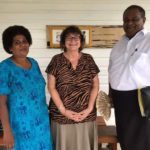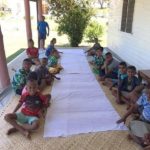Our FIJI Project
Fiji has a population of approx 927,00 people with children and youth aged 0–19 comprising 38.5 per cent of the total population with the median age being 27.9 years. Despite the glossy holiday-brochure image of Fiji, poverty is still a significant concern. Whilst the overall level of development and the moderately high average incomes have improved, this is not evenly distributed. Poverty in rural areas increased from 40% in 2002–2003 to 43% in 2008-2009, possibly, as a result of the decline in the sugar industry and expiring land leases for agriculture. It is estimated that between 25 and 33% of the Fijian population live in poverty. This includes a lack of food, adequate housing and educational opportunities.
Education
Lack of access to high-quality education in Fiji is a sad reality for those who cannot afford private schooling. Government-funded schools offer free education but other needs such as textbooks, uniforms, transportation, lunch etc must be funded by parents. There are (by Australian and New Zealand standards) over-crowded classrooms with high student to teacher ratios. Teachers are often unable to give individualized attention to students who have learning difficulties, language barriers or behavioural issues. Such children continue to `lag behind’ throughout their primary schooling resulting in low grades, a negative attitude toward learning, high levels of school drop-outs and limited work choices as children mature into adulthood.
Early Childhood Education and Care Matter
In Fiji, early childhood education is still at the embryonic stage with limited access to free preschool and kindergarten for the majority of children, especially in poorer districts. There is a need for specialist early childhood trained teachers and the establishment of conducive early childhood learning environments that reflect current pedagogical practices as well as neurological research on the importance of early brain development for future learning.
The children at St Tabitha’s Orphanage/Children’s Home come from local as well as rural districts. Some are wards of the State and others are unable to live with their families due to domestic violence, extreme poverty or lack of schooling in their villages. Some of the children have very little or no English language skills. They are placed in classes according to their age, without individualized learning support, resulting in their inability to ever ‘catch up.’ Such are the challenges of the children not only at St Tabitha’s but in the local schools.
We want to assist in supporting the care and education of the children at St Tabitha’s as well as children and their families in the local community.
Our Overall Aims Are:
- to offer high quality, affordable education (including Kindergarten, Primary School and a Tuition school) accessible to all families in the Lautoka Western District;
- to cater to the individual needs of the children at St Tabitha’s Orphanage and Children’s Home using a holistic approach to care and education that focuses on their physical, cognitive, social, emotional and spiritual development;
- to offer medical facilities for local under-privileged communities in ways that improve their health, diets and well-being thus improving their quality of life.
Beneficiaries
- Children under school age (early childhood);
- Orphans of all ages;
- Vulnerable children who enter the Children’s home for short and long-term stays;
- Children primary and high school age;
- Local job-seeking people of all ages;
- Vulnerable families and individuals in the community;
- Children and adults needing medical assistance;
- Financially disadvantaged families;
Expectations
With the completion of educational and medical facilities, we expect to see over 1,000 children and adults regularly helped in some way. Local people will be involved in the initial planning stages via Community meetings, information sharing, pastoral care and consultations and ongoing school committees and working groups.
Highly trained international professionals will be volunteering their services in all industries for periods of time (one month to several years). There will be a strong focus on succession planning to skill locals as well as the sourcing of local professionals such as teachers, doctors, construction workers and others who will also act as mentors and helpers.
You Can Help
If you would like to help this project achieve its long term transformational goals for Fiji then you can donate by clicking on the “Donate to this Project” button on this page. For more information see our web site and Facebook page.





